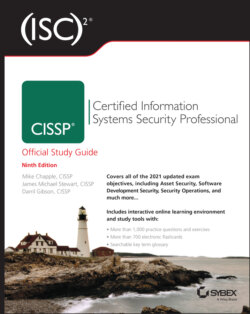Читать книгу (ISC)2 CISSP Certified Information Systems Security Professional Official Study Guide - Mike Chapple - Страница 78
Employee Oversight
ОглавлениеThroughout the employment lifetime of personnel, managers should regularly review or audit the job descriptions, work tasks, privileges, and responsibilities for every staff member. It is common for work tasks and privileges to drift over time. Drifting job responsibilities or privilege creep can also result in security violations. Excess privileges held by a worker represent increased risk to the organization. That risk includes the greater chance for mistakes to damage asset confidentiality, integrity, and availability (CIA) outside of the worker's actual responsibilities, greater ability for a disgruntled worker to cause harm on purpose, and greater ability for an attack that takes over a worker's account to cause harm. Reviewing and then adjusting user capabilities to realign with the principle of least privilege is a risk reduction strategy.
For some organizations, mostly those in the financial industry, a key part of this review process is enforcing mandatory vacations. Mandatory vacations are used as a peer review process. This process requires a worker to be away from the office and without remote access for one to two weeks per year. While the worker is on the “vacation,” a different worker performs their work duties with their actual user account, which makes it easier to verify the work tasks and privileges of employees while attempting to detect abuse, fraud, or negligence on the part of the original employee. This technique often works better than others since it may be possible to hide violations from other accounts, but it is very difficult to commit violations and hide them from the account used to perform them.
Other user and worker management and evaluation techniques include separation of duties, job rotation, and cross-training. These concepts are discussed in Chapter 16.
When several people work together to perpetrate a crime, it's called collusion. Employing the principles of separation of duties, restricted job responsibilities, mandatory vacations, job rotation, and cross-training reduces the likelihood that a coworker will be willing to collaborate on an illegal or abusive scheme because of the higher risk of detection. Collusion and other privilege abuses can also be reduced through strict monitoring of special privileges and privileged accounts, such as those of an administrator, root, and others.
For many job positions that are considered sensitive or critical, especially in medical, financial, government, and military organizations, periodic revaluation of employees may be needed. This could be a process that is just as thorough as the original background check and investigation performed when the individual was hired, or it may require performing only a few specific checks to confirm consistency in the person's qualifications as well as researching for any new information regarding disqualifications.
User behavior analytics (UBA) and user and entity behavior analytics (UEBA) are the concepts of analyzing the behavior of users, subjects, visitors, customers, and so forth for some specific goal or purpose. The E in UEBA extends the analysis to include entity activities that take place but that are not necessarily directly linked or tied to a user's specific actions, but that can still correlate to a vulnerability, reconnaissance, intrusion, breach, or exploit occurrence. Information collected from UBA/UEBA monitoring can be used to improve personnel security policies, procedures, training, and related security oversight programs.
